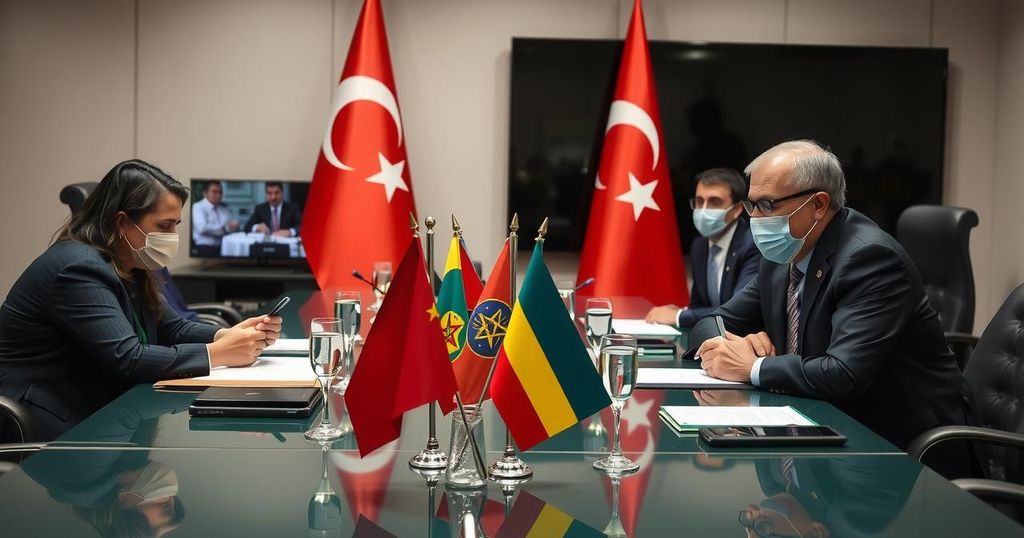Turkey Mediates Landmark Agreement Between Somalia and Ethiopia

Somali President Hassan Sheikh Mohamud and Ethiopian Prime Minister Abiy Ahmed reached a significant agreement in Ankara, facilitated by Turkey, resolving a contentious maritime dispute. The Ankara Declaration affirmed Somalia’s territorial integrity while granting Ethiopia commercial access to the Somali coastline, reflecting both nations’ diplomatic efforts to find common ground amidst rising tensions.
On Wednesday in Ankara, Turkish President Recep Tayyip Erdogan hosted discussions between Somali President Hassan Sheikh Mohamud and Ethiopian Prime Minister Abiy Ahmed. Despite a year of mediation efforts by Turkey regarding the sea port crisis, no substantial progress had previously been made. Somalia has demanded the cancellation of an Ethiopian memorandum of understanding (MoU) with Somaliland, which would provide Ethiopia with sea access for 50 years. Somalia views this agreement as a challenge to its territorial integrity, threatening military retaliation if necessary. Conversely, Ethiopia argues that international law supports its right to access the sea due to its landlocked status.
Erdogan firmly stated, “You won’t leave this room until you reach a deal.” Both leaders participated in nearly seven hours of intense negotiations. Ethiopia’s recognition of Somalia’s territorial unity emerged as a critical sticking point, as Abiy was hesitant to include language confirming Somalia’s territorial integrity. Somali representatives referenced the 1933 Montevideo Convention, underscoring the legal foundations for statehood, which necessitate a defined territory. Turkish officials found these points persuasive, prompting a commitment by Ethiopia to officially recognize the territorial unity of Somalia.
Eventually, the two nations forged the Ankara Declaration, granting Somalia the recognition of its territorial integrity and allowing Ethiopia commercial access to the Somali coastline. The agreement also mandates technical discussions facilitated by Turkey to commence no later than February 2025, with completion targeted within four months. Experts noted that this arrangement was favorable for both nations as it resolved longstanding tensions.
Somalia’s diplomatic maneuvering has reportedly yielded significant benefits, including a recent naval and energy partnership with Turkey. Conversely, Abiy’s concessions were perceived as a response to diplomatic pressure from the United States. There are concerns about regional stability, particularly regarding the security contributions by Ethiopia to African peacekeeping forces. Under this agreement, Ethiopian military presence in Somalia will continue.
The changing political dynamics in Somaliland, following recent presidential elections, complicate matters further, as the new leadership may seek different terms with Ethiopia. Analysts posit that Abiy’s actions in heightening this crisis ultimately served to elevate Ethiopia’s access to the Somali coast. This strategic deal represents a balanced resolution, providing both leaders with favorable outcomes.
The negotiations between Somalia and Ethiopia revolve around a contentious Memorandum of Understanding that Ethiopia signed with Somaliland. This agreement aimed to give Ethiopia significant maritime privileges via Somaliland’s coast, which Somalia perceived as a threat to its sovereignty. Historically, Ethiopia has faced geographical limitations due to its landlocked status, which has prompted the current leadership to seek viable access points via the sea. The support of Turkey has been instrumental in these negotiations, reflecting both nations’ reliance on external diplomatic intervention to facilitate compromise amid rising tensions.
The Ankara Declaration marks a pivotal moment in Somali-Ethiopian relations, affirming Somalia’s territorial integrity while allowing Ethiopia commercial access to the vital Somali coastline. Through Turkish mediation, both countries have made significant strides toward resolving their maritime disputes. The agreement underscores the importance of cooperative dialogue in addressing complex geopolitical issues, reflecting both nations’ strategic priorities and their capacity to negotiate win-win scenarios. As regional dynamics continue to evolve, this accord might further influence broader peacekeeping and stability efforts in East Africa.
Original Source: www.middleeasteye.net








